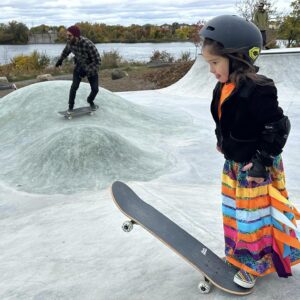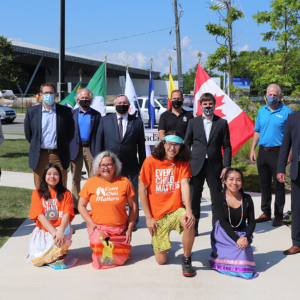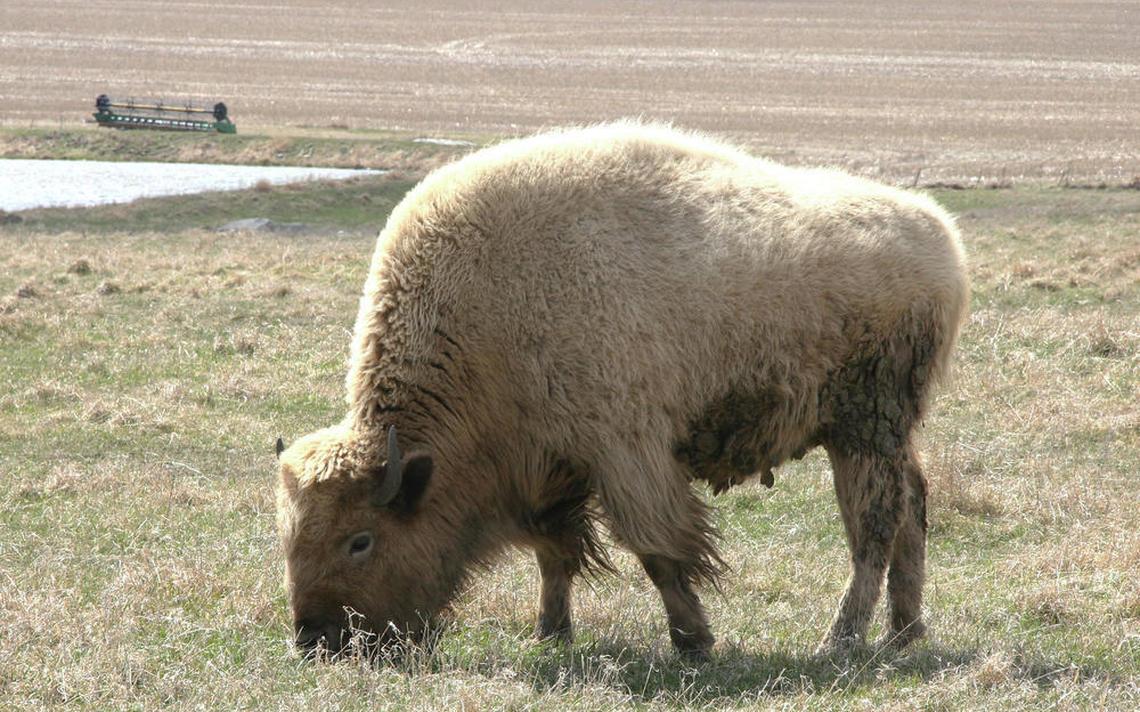Penetanguishene – On November 9th, for the second weekend in a row, a delegation from the [tweetable]Canadian Union of Public Employees Local 3903 joined the Oshkimaadziig Unity Camp[/tweetable] to help construct a hunting lodge, chop wood for the winter, and build new relationships with Anishinabek people.
The Oshkimaadziig Unity Camp is reclaiming ancestral Anishinabek land in Awenda Provincial Park, at the site of an historic counsel rock in Penetanguishene. It is guided by a vision referring to the “New People of the Seventh Fire Prophecy, who will pick up the many things left on the trail to ensure Humanity’s survival in the Eighth Fire.” The camp began in protest to the Coldwater Narrows Settlement agreement. By reclaiming Crown land, the camp also aims to educate others about treaties and agreements that came before modern day settlements with the Crown. It is organized by the Anishinabek Confederacy to Invoke Our Nationhood (ACTION).
Oshkimaadziig is busy preparing for the winter, while facing increased questioning from both the Ministry of Natural Resources and the OPP. In this context, the CUPE 3903 First Nations Solidarity Working Group responded to an invitation for work trips to join the camp.
On the second weekend delegation, seven members camped over night, woke up to the cold November rain, and joined Giibwanisi Dishnikaaz and Johnny Hawk as they led the work for the day.
So why are a group of members of a union representing contract faculty, teaching assistants and graduate assistants at York University, joining the work at this unity camp?
Some of the CUPE 3903 members described the mutual benefit in a relationship between unions and land reclamations struggles. Karl Gardner said, “the relationship, besides giving time and labour, can be one of exposure for each other. We can be the direct link between a potentially politicized union and these reclamations which wouldn’t really get talked about in the union setting. We’re building the link so we can be the line of communication between the two. In moving forward, it’s building the groundwork of relationships that we will be able to call on, on both ends.”
Sareh Serajelahi agreed, “Talking about these issues in union meetings is one thing, but actually coming out when we’re invited, to make some real movement on the ground and help set up shelter is much better.”
Salmaan Khan added “This work is so important in breaking the slump that the bureaucracy has and that characterizes the union. It’s this kind of political work that actually will help push the union to what it was supposed to be in the first place – a organization where people are coming together to actively try and fight or work for change.”
Gesturing to work being done to insulate the hunting lodge, and several people gathering and chopping wood, Brendan Arnott said “The idea of collective action here, the way people have been working together – at the root of that is a decolonizing mindset that could translate into any setting, really.”
“I think what people are doing here, connecting with this Anishnabek struggles to reclaim ancestral lands and reconnect with ancestral tradition, those of us who are not indigenous to Turtle Island and haven’t been indigenous for maybe thousands of years, can learn some very basic principles about our ultimate connection to Mother Earth, particularly at this historical moment where capitalism is destroying the planet.” Steve DaSilva states. He adds, laughing, “And as academic workers, it’s good to come out and chop some wood.”
Jeff Zaballah saw similar lessons. “We as students are faced with various forms of oppression and institutional barriers too, and this is a perfect example of how we as members can come together to combat for example, environmental issues.”
Johnny Hawk, co-founder of Oshkimaadziig, said “I think its integral that we develop a strong working relationship. Because what’s happening is we both have contracts and our contracts are being (broken) with the common boss – the government”.
Giibwanisi Dizhnikaaz, co-founder of Oshkimaadziig, describes the relationship between unions and the camp’s goals with reference the Two Row Wampum. He states “Us out here, there are very few. We are trying to rebuild our canoe way of life. It is firmly entrenched and on the settler ship. Those that are in the settler ship can help us by helping repair the canoe way of life…And I think if there was a relationship like we saw at Kanonhstaton (Six Nations land reclamation in Caledonia, ON), we see that these things work and they actually strengthen each other’s position.”
In terms of support moving forward, Giibwanisi states “We do need the physical help. Another thing we are constantly in need of is tools, supplies, transportation, obviously continued financial support is greatly appreciated and needed.”
Mari Reeve is non-Anishinabek and has been a part of the work of the camp for over a year. While preparing lunch over the fire, she looks out at the busy site. “Seeing people come really gives you hope and helps relight the fire. The more people we have up here to help, the faster the work gets done, the better the conversation, the more food we’ll all have.”








Comments are closed.